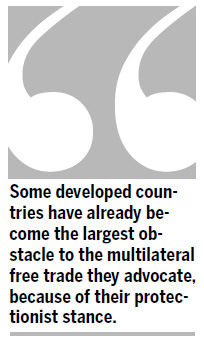Protectionism not the cure
Updated: 2011-10-31 08:02
By Lu Duo (China Daily)
|
|||||||||||

Politicizing economic issues will not treat the ailing global economy and G20 summit must take steps to inject vitality
The sixth G20 summit meeting is due to be convened on Nov 3 in the French city of Cannes where participating leaders are expected to discuss a wide range of economic issues, from the debt crisis in Europe to the global economic slowdown and financial turbulences.
In addition to such pressing topics, it is also hoped the G20 leaders will pay close attention to the development of international trade, given that it has served as an important driver of the world's economic development and is indispensable to the revival of the global economy.
However, the outlook for world trade is pessimistic. According to a reported co-published by the World Trade Organization (WTO) and the United Nations Conference on Trade and Development (UNCTAD), global trade protectionism was on the rise from December 2010 to May 2011. There were a total of 463 new protectionist cases during this period, an increase of 61 percent on the previous six months. Some developed countries have already become the largest obstacle to the multilateral free trade they advocate, and, because of their protectionist stance, the Doha Round has failed to achieve any substantial progress. Now, it is a dream out of reach an early agreement to resolve the concerns raised by the world's most underdeveloped nations.
The passage of the Currency Exchange Rate Oversight Reform Act of 2011 by the US Senate on Oct 12, a bill that demands the US government impose punitive tariffs on trading partners whose currencies it considers seriously undervalued, has further sparked worries about the coming of a worldwide trade war.
Trade protectionism has never been good for world trade. It is detrimental to all parties involved. In a move to force Japan into appreciating its yen in the 1970s and 1980s - an attempt to stop the entry of Japanese automobiles into the US market - the United States pressured Tokyo into signing the Plaza Accord. However, this failed to reverse the decline of the US' three auto manufacturers and Detroit still fell into recession.
In recent years, the US has taken protectionist measures against imports of Chinese tires. As a result, the volume of tires China exported to the US decreased by 23.6 percent in 2010. However, the US' tire import volumes increased by 20.2 percent that year.
The current world trade imbalances and the bilateral trade deficit, which certain developed countries have tried to lash out at, are in essence a result of the diversified international labor division, the unreasonable international monetary system and the existence of export limitations imposed by some countries.
Letting others take the medicine for their own illness seems to be regarded by some politicians as an effective way to resolve their trade issues with other countries. However, this simply demonstrates their stereotyped mindset of politicizing economic issues.
As an important forum of multilateral economic cooperation, the G20 Cannes Summit will inevitably inject a new vitality into the fragile world economy and build market confidence if it can make progress on the trade issue.
The G20 leaders should hold high the banner against trade protectionism and reaffirm the commitments made at the Toronto and Seoul summits that new measures will be worked out by the end of 2013, to promote world trade monitored by the WTO. With 80 percent of the world's economic output, the fulfillment of such a commitment by the G20 members will undoubtedly help boost the global economic recovery.
The Cannes summit should continue to push forward the Doha Development Round talks and push for the implementation of a duty-free and quota-free policy for the exports of the world's most underdeveloped countries. Compared with their developed counterparts, the world's developing and most underdeveloped countries have a lower economic output and weaker competitiveness. However, they enjoy huge development potential and will become new sources of global economic growth if given the chance.
Under a consensus reached at the WTO's Hong Kong ministerial meeting in 2005, a majority of developed countries and some developing ones, such as China, Brazil and India, made commitments to implement such a "double-free" policy for the most underdeveloped nations. Regrettably, the US has so far failed to do so. But if it can adopt a positive attitude toward this issue at the Cannes summit it will help clear some of the gloom hanging over the global economy.
The author is a Beijing-based international issues observer.
(China Daily 10/31/2011 page8)








